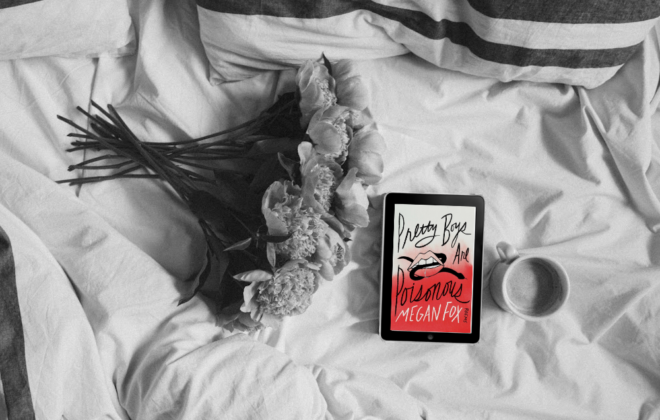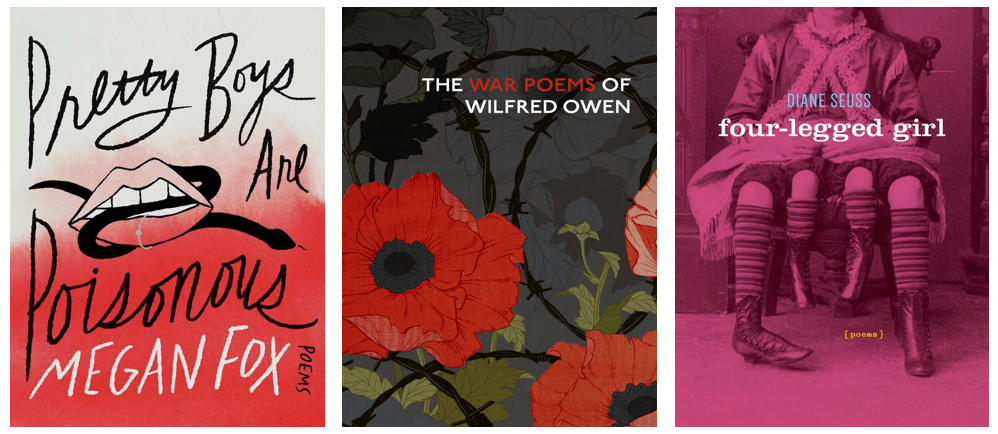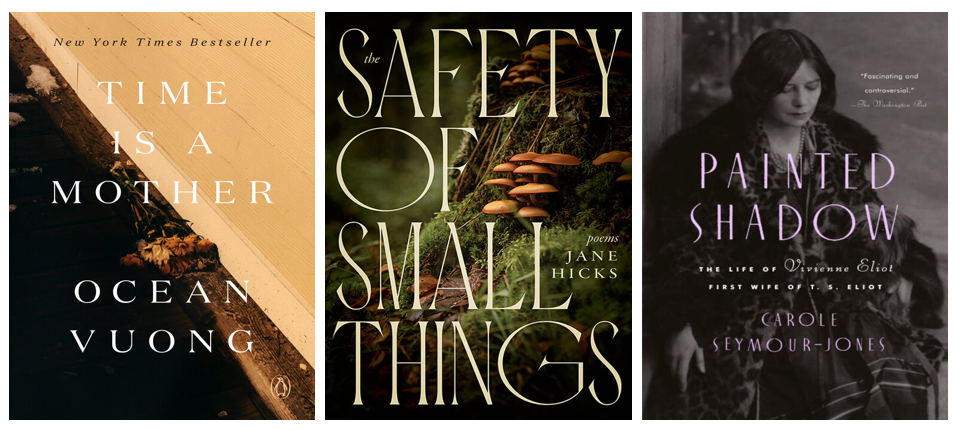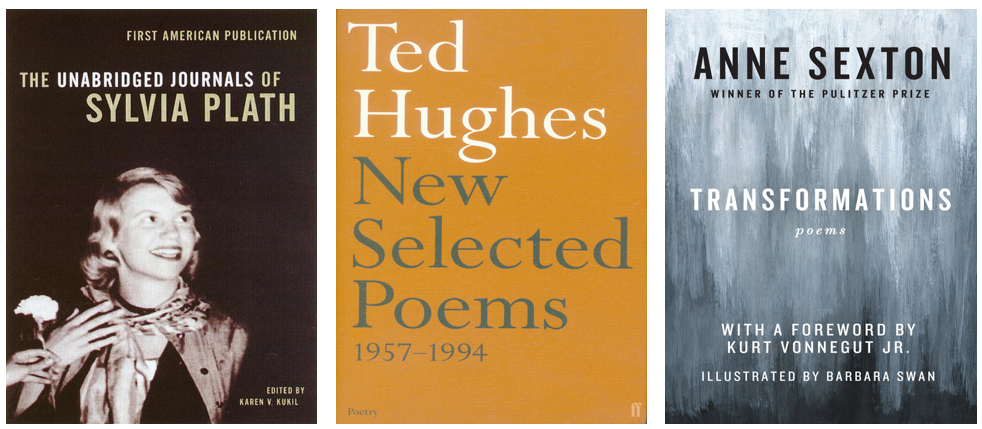
The agony and the album: 13 poets to read while waiting for Taylor Swift’s next masterpiece
I was very late to the Taylor Swift party. And by “very late” I mean Folklore was the first Taylor Swift album I ever listened to, but I have been a fan ever since. Midnights is part of my vinyl collection and of course I preordered The Tortured Poets Department as soon as it was announced.
Now, I may not know Taylor’s back catalog as well as her newer eras, but I do know a thing or two about tortured poets. Had you known me twenty years ago when I was majoring in creative writing with a minor in English you may have even called me one (lolsob). And while my Sylvia Plath tattoo is from The Bell Jar and not Ariel, I did quote her poem “Female Author” in the artist statement of my BFA senior thesis.
As any good Swiftie will tell you, the release of The Tortured Poets Department in the middle of National Poetry Month is not a coincidence. For those librarians planning ahead, here are some poetry programming ideas to use this April:
National Poetry Month programming ideas
- Create a curated collection of poets for your digital library. This can include collections of poetry, biographies, memoirs, and journals.
- Have poetry writing workshops led by local poets in your community.
- Start a poetry book club! Each month, select a different collection of poems participants can read and discuss.
- Work with your local school district to find opportunities to nurture young poets through programming, writing classes, or community mentorship.
- Host open mic nights where poets can read their poems aloud to an audience.
Right now, poetry is a sure-fire way to reach the Taylor Swift fans in your community. From the intimate journals of iconic poets of the 1960s to contemporary examinations of grief and trauma, here are some poets to add to your digital collection while we all wait for Taylor Swift’s next musical masterpiece.
13 poets to read while waiting for The Tortured Poets Department
The Unabridged Journals of Sylvia Plath by Sylvia Plath
Purchase the ebook here
I was a library page in high-school and college, and as all pages can attest, one of the best parts of the job is browsing books while you reshelve. At my hometown’s old library, there was this corner in the 100s I would hide sit in with a book. One of those books was Plath’s journals. I loved seeing the inner workings of a writer I had long admired and felt a certain kinship to. When we talk about “tortured poets” she is probably the first that comes to mind, and her poetry truly sings. But it’s her journals I find to be the most illuminating. In fact, one quote from her journals I have kept with me all these years is from an entry dated February 25, 1956: “What I fear the most, I think, is the death of the imagination” (written on the back of a CLEVNET request routing slip that I still have).
New Selected Poems (1957-1994) by Ted Hughes
Purchase the ebook here
Considering I shared I have a Sylvia Plath tattoo and started this list with her journals, this is going to be a controversial statement, but, I like Ted Hughes’s poetry more. In particular his Crow poems; in college I even wrote a stageplay inspired by Crow (see above re: knowing me twenty years ago). If you are unfamiliar with the history of Hughes and Plath, just know he refused to address the 1963 death of his first wife until 1998, when he released a poetry collection titled Birthday Letters. Several of the poems that would eventually be in Birthday Letters appear in New Selected under “Uncollected.”
Transformations by Anne Sexton
Purchase the ebook here
One of the reasons I love Hughes’s Crow poems so much is the collection reads like a fable. Therefore, it should be no surprise that Anne Sexton’s Transformations – a reimagining of Grimms fairy tales – is on my list. Sexton’s poetry was intimate, detailing her struggles with mental health and topics often considered taboo. Her relationships were tumultuous and abusive, as chronicled by her daughter in Searching for Mercy Street.

Pretty Boys are Poisonous by Megan Fox
Purchase the ebook here
Yes. That Megan Fox.
In describing her poems, Fox says, “These poems were written in an attempt to excise the illness that had taken root in me because of my silence. I’ve spent my entire life keeping the secrets of men, my body aches from carrying the weight of their sins. My freedom lives in these pages, and I hope that my words can inspire others to take back their happiness and their identity by using their voice to illuminate what’s been buried, but not forgotten, in the darkness.”
The War Poems of Wilfred Owen by Wilfred Owen
Purchase the ebook here
While Owen began writing poetry prior to World War I, his legacy is heralded by his poetry about the horrors of war. He was not afraid to tell the truth, frequently writing about his experiences of the trenches in graphic detail. Owen was killed in action in November 1918, and only five of his poems were published while he was alive. Due to the topic of Owen’s poetry, many other poets dismissed him. William Butler Yeats, in particular, was harsh, going so far as to omit Owen from the Oxford Book of Modern Verse, saying Owen’s poetry was all “blood, dirt, and sucked sugar stick” and “passive suffering is not a theme for poetry.”
(On the other hand, my man Ted Hughes in reviewing Owen’s poetry said, “He set himself to present the sufferings of the front line, with the youth and millions of deaths and smashed hopes of his whole generation behind him, as vividly and frighteningly as possible, not because they were piteous. . . but because it was wrong, and the crime of fools who could not see because they would not feel.”)
Four-Legged Girl by Diane Seuss
Purchase the ebook here
When I asked my former BFA classmates for recommendations for this list, my poet friend Sara Moore Wagner said, “THE Diane Seuss.” In her third poetry collection, Seuss’s audacious, hothouse language swerves into pain and rapture, as she recounts a life lived at the edges of containment. Ghostly, sexy, and plaintive, these poems skip to the tune of a jump rope, fill a wishing well with desire and other trinkets, and they remember past lush lives in New York City, in rural Michigan, and in love. In the final poem, she sings of the four-legged girl, the body made strange to itself and to others.

Time Is a Mother by Ocean Vuong
Purchase the ebook here
Vuong’s second poetry collection, Time Is a Mother is a deeply personal journey with a poet as they write through their grief and navigate life after the death of a parent. Shifting through memory, and in concert with the themes of his novel On Earth We’re Briefly Gorgeous, Vuong contends with personal loss, the meaning of family, and the cost of being the product of an American war in America. At once vivid, brave, and propulsive, Vuong’s poems circle fragmented lives to find both restoration as well as the epicenter of the break.
The Safety of Small Things by Jane Hicks
Purchase the ebook here
Like Vuong, Hicks’s collection is a meditation on mortality. Images of stark examination rooms, the ravages of chemotherapy, biopsies, and gel-soaked towels entwine with remembrance to reveal grace and even beauty where they are least expected. Jane Hicks captures contemporary Appalachia in all of its complexities: the world she presents constantly demonstrates how the past and the present (and even the future) mingle unexpectedly. The poems in this powerful collection juxtapose the splendor and revelation of nature and science, the circle of life, how family and memory give honor to those we’ve lost, and how they can all fit together. This lyrical and contemplative yet provocative collection sings a song of lucidity, redemption, and celebration.
Painted Shadow by Carole Seymour-Jones
Purchase the ebook here
As noted, Taylor Swift’s forthcoming album The Tortured Poets Department comes out in April, which is National Poetry Month. And of course, talking about National Poetry Month in April often leads one to quote poet T.S. “April is the cruellest month” Eliot.
But I don’t want to talk about Eliot. That guy has had enough written about him over the years. Instead, I want to talk about his first wife, Vivienne Haigh-Wood. Sure, I may have another tattoo partially inspired by “The Waste Land” (wow, I truly am a cliche), but that senior thesis of mine? It included a poem I wrote and dedicated to Vivienne. Painted Shadow examines the life of Vivienne Haigh-Wood Eliot and her role in the writings of her tortured poet husband.

Nature Poem by Tommy Pico
Purchase the ebook here
Inspired by the epic tradition of poetry, Pico’s book-length poem follows a young, queer, urban-dwelling American Indian poet who can’t bring himself to write a nature poem. Instead, he is forced to reckon with manifest destiny, genocide, and centuries of disenfranchisement while learning to have faith in his own voice.
Bless the Daughter Raised by a Voice in Her Head by Warsan Shire
Purchase the ebook here
Shortlisted for the 2022 Felix Dennis Prize for Best First Collection and the 2023 Dylan Thomas Prize, Bless the Daughter Raised by a Voice In Her Head introduces us to a young girl, who, in the absence of a nurturing guide, makes her own way toward womanhood. Drawing from her own life, as well as pop culture and news headlines, Shire finds vivid, unique details in the experiences of refugees and immigrants, mothers and daughters, Black women and teenage girls. In Shire’s hands, lives spring into fullness. This is noisy life, full of music and weeping and surahs and sirens and birds. This is fragrant life, full of blood and perfume and shisha smoke and jasmine and incense. This is polychrome life, full of henna and moonlight and lipstick and turmeric and kohl.
Tonguebreaker by Leah Lakshmi Piepzna-Samarasinha
Purchase the ebook here
In their fourth poetry collection, Leah Lakshmi Piepzna-Samarasinha writes about surviving the unsurvivable: living through hate crimes, the suicides of queer kin, and the rise of fascism while falling in love and walking through your beloved’s Queens neighborhood. As they write in the introduction: “This book is not what I intended it to be, but it is the book that needed to be written, and a map of the wending, winding creative process of being a working class, disabled, femme of color artist who is awake, living and noticing, in these times.”
50 Things Kate Bush Taught Me About the Multiverse by Karyna McGlynn
Purchase the ebook here
McGlynn’s third collection is a book of tragicomic gurlesque word-witchery inspired by the Kate Bush cosmos. Campily glamorous, darkly funny, obsessively ekphrastic, boozily baroque, psychedelically girly & musically ecstatic. My favorite line from Taylor Swift’s “Anti-Hero” is When my depression works the graveyard shift / all of the people I’ve ghosted stand there in the room, so any poetry collection that opens with a poem called “A Real Artist Makes Us Fall in Love with Ghosts” is sure to appeal to fans of Kate Bush and Taylor Swift.
More recommended lists
 About the author: Jill Grunenwald is a Marketing & Communications Specialist on the North America Public Library Marketing Team. A former librarian, she joined OverDrive in 2015. Outside of the office she can be found writing, hanging out with her cats, collecting more Tarot decks than she has room for, and playing competitive pinball. Her favorite genre is something she calls “Murder at an educational institution that involves a close-knit group of suspicious characters.”
About the author: Jill Grunenwald is a Marketing & Communications Specialist on the North America Public Library Marketing Team. A former librarian, she joined OverDrive in 2015. Outside of the office she can be found writing, hanging out with her cats, collecting more Tarot decks than she has room for, and playing competitive pinball. Her favorite genre is something she calls “Murder at an educational institution that involves a close-knit group of suspicious characters.”
Tags In
Browse blog and media articles
Public Library Training
K-12 Library Training
